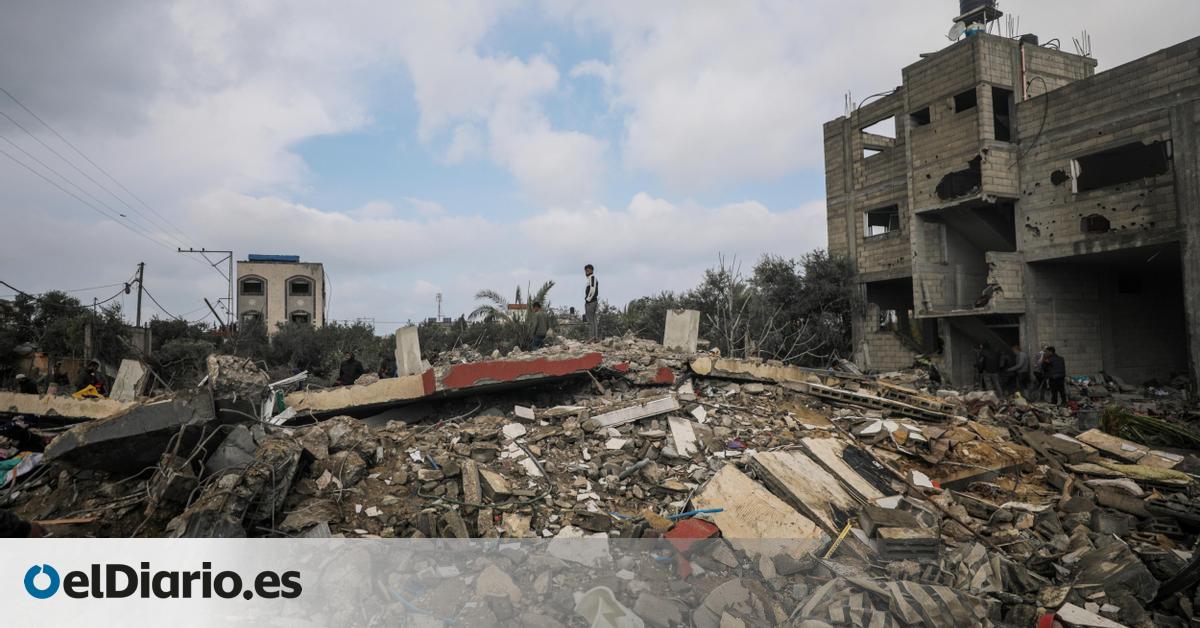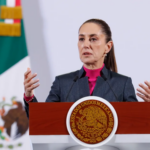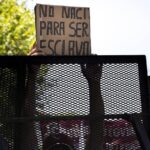
Almost six months after the siege of the Gaza Strip began, which has caused a “catastrophic” humanitarian situation, and with more than 30,000 dead from Israel’s attacks, the EU calls for a ceasefire for the first time. The balances and collusion with Israel had prevented there from being a consensus around that position throughout this time. Until now, the meeting point had been the request for “humanitarian pauses”, but the deterioration of the situation due to Benjamin Netanyahu’s blockade and the threat now of expanding the attack on Rafah, added to the harshening of criticism from Washington, has led the 27 to make a move.
“The European Council calls for an immediate humanitarian pause that leads to a sustainable ceasefire, the unconditional release of the hostages and the provision of humanitarian assistance,” include the conclusions adopted by the leaders of the 27, who express their “deep concern.” ” for “the catastrophic humanitarian situation in Gaza and its disproportionate effect on civilians, particularly children, as well as the imminent risk of famine.” “Full, rapid, safe and unhindered humanitarian access to and throughout the Gaza Strip via all routes is essential to provide civilians with life-saving assistance and basic services on a large scale,” the agreed document adds. this Thursday.
A slow hardening of the position
The negotiation at the lower levels of this hardening of the common position has continued for weeks and the step coincides in time with the decision of the United States to bring to the UN a resolution in which it demands an immediate ceasefire and that even now he had vetoed. A month ago the foreign ministers reached the same conclusion that the leaders issued this Thursday, but Hungary vetoed the proposal, so it remained at a text of 26. Viktor Orbán has arrived at the European Council with a different speech and in favor of “protect Gaza”, as their team recognized.
“There are no words to explain the situation in Gaza,” the high representative, Josep Borrell, has once again cried out. “A ceasefire should have happened a long time ago,” said the still Irish Prime Minister, Leo Varadkar, who, together with Pedro Sánchez and the Belgian, Alexander de Croo, were the first EU leaders to demand a ceasefire. without success, because the position remained at a minimum months ago and the debate was not reopened.
On this occasion, even the German Chancellor, Olaf Scholz, who is one of those who has the most regard for his country’s ties with Israel, has hoped that “a lasting ceasefire is now possible.” Estonian Kaja Kallas also advocated “supporting a ceasefire so that lives can be saved to move towards a two-state solution.”
Warning about attack on Rafah
The text also calls on Israel not to carry out a ground operation in Rafah, where nearly a million people “seek security and access to humanitarian aid.” The possibility of an attack in that area raised alarm bells in the international community. Even the United States, which in recent weeks has also toughened its criticism, has demanded that Netanyahu desist from his plans.
The EU has been less ambitious than Washington in its sanctions on extremist settlers in the West Bank over Hungary’s problems. Even so, the text calls for the “immediate cessation of violence in the West Bank and East Jerusalem.” “The perpetrators must be held accountable,” add the EU leaders who “condemn” Israel’s intention to continue “expanding illegal settlements in the occupied West Bank” and urge it to reverse those decisions.
The conclusions of the European Council reiterate the condemnation of the Hamas attacks of October 7 as well as Israel’s right to self-defense, although they once again point out the need to respect “international and humanitarian law.” However, the EU has cooled the possibility of reviewing the trade agreement with Israel due to violations of that legal framework that governs armed conflicts and involves the protection of the civilian population. Spain and Ireland requested it in a letter sent to the European Commission, which is still studying the response; But last Monday the Foreign Ministers ruled out the possibility of summoning their Israeli counterpart in the context of the association agreement, as José Manuel Albares claimed. What the leaders express in their conclusions, furthermore, is that violations of international humanitarian law must be subjected to a “thorough and independent” investigation.
Although in writing the words are very measured, the president of the European Council, Charles Michel, went a step further during the press conference after the meeting: “It is important to support the Israelis, but also ask the Government [de Benjamín Netanyahu] that respects international law and does not have double standards.” “Israel has the right to defend itself, but it also has the duty to protect civilians,” said Ursula von der Leyen, whose alignment with Netanyahu at the beginning of the war angered the EU.
Support to UNRWA
The leaders of the 27 also express support for the UN agency for Palestinian refugees (UNRWA) after Brussels temporarily suspended aid (which has since been reactivated) as did several countries over the accusations against a dozen workers of having collaborated in the Hamas attacks. “The European Council emphasizes that the services that UNRWA provides in Gaza and throughout the region are essential,” says the text, which reiterates “satisfaction” with the internal UN investigation.
The Secretary General of the United Nations, Antònio Guterres, whom Israel has placed in the target, was in Brussels this Thursday, where he participated in a lunch with the heads of Government of the 27 and the leaders of the EU. Guterres has called against the “collective punishment” of the Gazan population.
Desperate appeal from Ukraine
As is customary since the war in Ukraine began, the president, Volodymyr Zelensky, has addressed European leaders by videoconference and reproached them for the lack of ammunition to confront the Russian invasion. “Unfortunately, the use of artillery on the front by our soldiers is humiliating for Europe, in the sense that Europe can contribute more. It is crucial to prove it now,” he stated.
Increasing support for Ukraine is one of the main issues that European leaders have on the table. Hungary has recently unlocked a new tranche of 5 billion from the European Peace Fund through which military aid is channeled to kyiv. Borrell has presented the proposal to use the interests generated by frozen Russian assets knowing that he still does not have the necessary consensus, but with the intention of moving forward.
In a press conference after the meeting, the president of the European Commission, Ursula von der Leyen, revealed that she has urged the leaders of the 27 to act quickly so that the first 1 billion euros can be sent in July.
Source: www.eldiario.es

